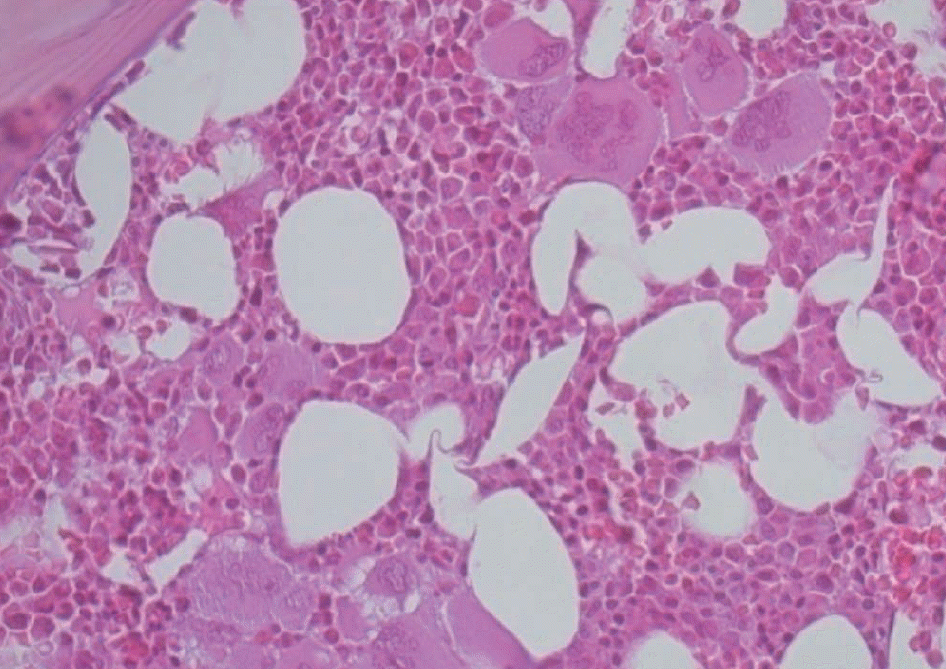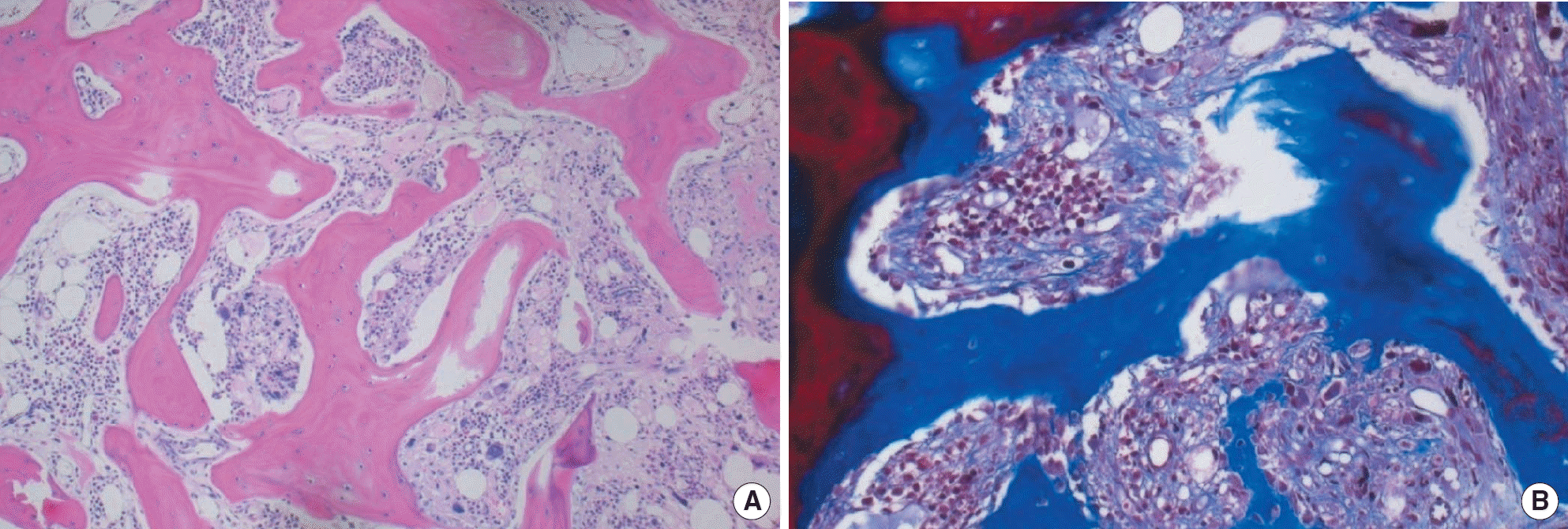Abstract
Essential thrombocythemia (ET) is a chronic myeloproliferative neoplasm that involves primarily the megakaryocytic lineage. After many years, a few patients with ET may develop bone marrow (BM) fibrosis and rarely develop osteosclerosis. A 60-yr-old female was admitted due to severe left upper quadrant abdominal discomfort. She had been diagnosed as ET 19 yrs ago. On liver computed tomography severe splenomegaly was shown. Laboratory tests revealed WBC 24.3×109/L, hemoglobin 13.4 g/dL, platelets 432×109/L, lactate dehydrogenase 4,065 IU/L (reference range; 240-480). Blood smear demonstrated leukoerythroblastosis, teardrop cells, and giant and hypogranular platelets. BM study revealed inadequate aspirate due to dry tap. BM biopsy showed clusters of dysplastic megakaryocytes, grade 3 fibrosis, and severe osteosclerosis. Major/minor BCR-ABL1 rearrangement and JAK2 V617F mutation were not detected. Cytogenetic studies revealed normal karyotype. According to the 2008 WHO diagnostic criteria, the patient was diagnosed as having post-essential thrombocythemia myelofibrosis with severe osteosclerosis.
REFERENCES
1.Bain BJ, Clark DM, editors. Bone marrow pathology. 3rd ed.Oxford: Blackwell Science;2001. p. 468–9.
2.Buhr T., Georgii A., Choritz H. Myelofibrosis in chronic myelopro-liferative disorders. Incidence among subtypes according to the Hannover Classification. Pathol Res Pract. 1993. 189:121–32.
3.Thiele J., Kvasnicka HM., Schmitt-Graeff A., Zankovich R., Diehl V. Follow-up examinations including sequential bone marrow biopsies in essential thrombocythemia (ET): a retrospective clinicopathological study of 120 patients. Am J Hematol. 2002. 70:283–91.

4.Kreft A., Buche G., Ghalibafian M., Buhr T., Fischer T., Kirkpatrick CJ. The incidence of myelofibrosis in essential thrombocythaemia, polycythaemia vera and chronic idiopathic myelofibrosis: a retrospective evaluation of sequential bone marrow biopsies. Acta Haematol. 2005. 113:137–43.

5.Passamonti F., Rumi E., Arcaini L., Boveri E., Elena C., Pietra D, et al. Prognostic factors for thrombosis, myelofibrosis, and leukemia in essential thrombocythemia: a study of 605 patients. Haematologica. 2008. 93:1645–51.

6.Thiele J., Kvasnicka HM, et al. Essential thrombocythaemia. Swerdlow SH, Campo E, editors. WHO classification of tumours of haematopoietic and lymphoid tissues. 4th ed.Lyon: IARC;2008. p. 48–50.
7.Cervantes F., Alvarez-Larran A., Talarn C., Gomez M., Montserrat E. Myelofibrosis with myeloid metaplasia following essential thrombocythaemia: actuarial probability, presenting characteristics and evolution in a series of 195 patients. Br J Haematol. 2002. 118:786–90.

8.Kvasnicka HM., Thiele J. The impact of clinicopathological studies on staging and survival in essential thrombocythemia, chronic idiopathic myelofibrosis, and polycythemia rubra vera. Semin Thromb Hemost. 2006. 32:362–71.

9.Thiele J., Kvasnicka HM. Chronic myeloproliferative disorders with thrombocythemia: a comparative study of two classification systems (PVSG, WHO) on 839 patients. Ann Hematol. 2003. 82:148–52.

10.Thiele J., Kvasnicka HM. Clinicopathological criteria for differential diagnosis of thrombocythemias in various myeloproliferative disorders. Semin Thromb Hemost. 2006. 32:219–30.

11.Tefferi A., Thiele J., Orazi A., Kvasnicka HM., Barbui T., Hanson CA, et al. Proposals and rationale for revision of the World Health Organization diagnostic criteria for polycythemia vera, essential thrombocythemia, and primary myelofibrosis: recommendations from an ad hoc international expert panel. Blood. 2007. 110:1092–7.

12.Barosi G., Mesa RA., Thiele J., Cervantes F., Campbell PJ., Verstovsek S, et al. Proposed criteria for the diagnosis of post-polycythemia vera and post-essential thrombocythemia myelofibrosis: a consensus statement from the International Working Group for Myelofibrosis Research and Treatment. Leukemia. 2008. 22:437–8.

13.Lee CK., Kim HK., Lee KN. A case of multiple myeloma associated with osteosclerosis. Korean J Clin Pathol. 1991. 11:103–8. (이창규, 김혜경, 이갑노. 골경화증을 동반한 다발성 골수종 1예. 대한임상병리학회지 1991;11:103-8.).
14.Song SH., Lee HS., Park KU., Song J. A case of Hodgkin's lymphoma with bone marrow involvement showing severe osteosclerosis. Korean J Lab Med. 2005. 25:24–7. (송상훈, 이혜승, 박경운, 송정한. 호지킨 림프종에서심한골경화증을동반한골수침범1예. 대한진단검사의학회지 2005; 25: 24-7.).




 PDF
PDF ePub
ePub Citation
Citation Print
Print




 XML Download
XML Download